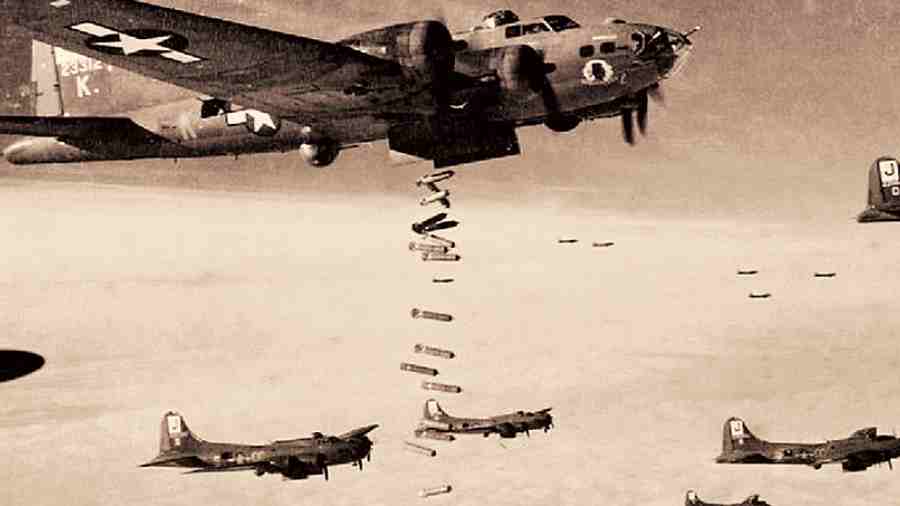The strongest segment of the Spanish army was its troops based in Morocco. Called the Army of Africa, they were airlifted to Spain following the military coup of 1936 in an operation featuring transport aircraft provided by Nazi Germany.
Another first — a not so well-established one — happened at the Battle of El Mazuco. Fought between the Nationalists and a significantly smaller Republican side, this battle, which featured air support by the Condor Legion manned by military personnel from Nazi Germany, is believed to have witnessed one of the first attempts at carpet-bombing. Later, in March 1938, the bombing of Barcelona by German and Italian air forces came to be considered as the first instance of a city being carpet-bombed.
Carpet-bombing was used extensively in the Second World War. On the night of March 9-10, 1945, the United States Air Force attacked Tokyo with more than 300 heavy bombers killing more than 100,000 Japanese. Similar attacks on Kobe, Osaka and Nagoya followed. During the Vietnam War, the USAF deployed the technique, once again. The carpet-bombing of cities, towns, villages or other areas containing civilians is now considered a war crime as per Article 51 of the 1977 Protocol I of the Geneva Convention.
A notable trend of the 20th century has been the mainstreaming of the military imagination. Competitions within the pursuit of wealth are frequently compared to war. Consequently, violence in the mind is not only overlooked but it also passes off as acceptable. Business strategies borrow a lot from military thinking. Companies compete much in the same way as armies going to war. And unlike Kalinga, a battlefield that made Ashoka reflect on what he did, not even global warming and climate change — the consequence of its actions — spur modern industry to rethink its ways. Worldwide, Senates and Parliaments have become real estate that politicians fight over for ownership. The strategy used to accomplish this is not very different from those seen in warfare; they are advertised with aplomb for those wishing to be military-like in conduct.
Notwithstanding their respective status as the world’s oldest democracy and the world’s biggest democracy, in both the United States of America and India, shadow actors cast on military line sexist. Even the media have been weaponised. The way the media and social media were used by aggressive political parties to dominate national discourse in the past decade has been nothing short of obliteration bombing (another term for carpet-bombing). Wave after wave of propaganda has had the same effect as a sky darkened by bombers in wartime.
On November 17, a news report on a senior Indian politician’s scheduled appearance at multiple rallies sported “carpet-bomb” in the headline to convey the proposed sense of intensity of campaigning. Accurate or not, there is one thing to remember about the liberal borrowing of military imagination for civilian applications, be it in politics or business. Notwithstanding the prestige and the glamour linked to giant companies and the market’s applause for corporate battles won, there have been ample instances of red flags raised by whistle-blowers. Questionable technologies, dodgy deals and corrupt managements have been exposed. The same goes for politicians and political campaigns that leveraged some of these technologies for electioneering, cosied up to companies for funds, or copied military strategies to overwhelm the public.
The world’s militaries couldn’t dream up methods of warfare incrementally. They had their conduct checked by the Geneva Conventions, the Hague Conventions, and the Geneva Protocol. It won’t be long before military strategies borrowed for business and politics are similarly questioned and curbed.
War as a recommended paradigm to imagine life is not a joke.
It is a major problem.
Shyam G. Menon is a freelance journalist










